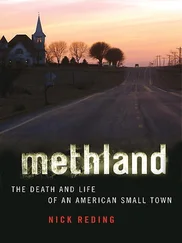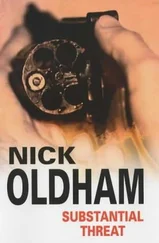Sergeanting had an answer to that. When you were utterly fucked and you didn’t know what to do, you got busy making sure everyone else was all right and told them not to worry and by the end of it there was a good chance you’d convinced yourself. And if you hadn’t, well, sooner or later you either died or you didn’t and in either case the problem went away. He hauled himself into the present and ordered a forward march, but that did require a definition of forward, and he wasn’t sure where that was, so he just said ‘You’re a good lad’ again, and stood there.
After a moment in this hiatus, the boy slipped quietly back under his arm and rested against the Sergeant’s ribs. The weight was familiar, as if they had sat in this way many times over many years and the Sergeant was only now remembering.
We are changed , the Sergeant thought. Of course we are. Whatever this is, we’re deeper in it.
He shifted slightly and brought his other arm around to make it a real hug, and heard a gasp. When he looked down, he saw under the wide boat-neck of the smock a series of stark blue-red lines across the boy’s shoulders, and recognised them after a moment as bruises.
Some people knew horses and some people knew guns. There were navy men who swore they could tell you from the taste of the water what ocean they were in. You picked things up as you went along and these things became part of you whether you really wanted them to or not. He suspected that Jed Kershaw could tell from walking into a room if someone was about to get shitcanned or promoted. It was just part of becoming who you were.
And Lester Ferris was an infantryman the way the Witch was a doctor. He’d hiked through snowfields and crawled across hot rocks, marched through opium fields and jungle, been shot at and occasionally shot, and blown up. At various times and in various places he’d fought men with his fists and his feet, with broken bottles and with bits of wood picked up from the floor. Some of them had wanted to kill him, others had just been enjoying a donnybrook. Three days ago he’d broken a man’s arm with a frying pan to save the life of one friend and avenge the death of another, had known as he was doing it exactly how much it hurt and how much force was necessary to make sure of the bones.
If Lester Ferris knew just one thing in the world the way meat knows salt, it was bruises.
So he knew a professional punishment beating when he saw one, and his world caught fire as if he had just been waiting to explode all along and now he was raining down on Mancreu like the volcano which had brought him here.
‘Who,’ he grated out, before he could hem himself in with cautions, ‘did that?’ It might be a parent, of course. That might be why the boy was so elusive yet so fond, so seemingly in need in a way the Sergeant could not quite reach. He had a bad dad and needed a good one he could run to when blood was not thick enough to endure. Well, if so, there would be words. ‘Who?’
The boy did not answer immediately, just looked back in something like amazement at the anger kindled in the Sergeant’s face, as if he hadn’t dared to expect it but now that he saw it he was drinking it in like nectar. Christ. Did I not make it obvious that I cared? Is this the only way you know? But then the thought blew away, a frozen bird tossed in the body of the storm.
‘Show me!’ the Sergeant demanded, then carefully bit back the measure of his fury so that he could say ‘please’ and not add to the boy’s injuries a disregard for his sovereignty, however badly he had already been infringed. (And how badly? If he had been, as the newspapers would have it, ‘abused’, there would be no place on the island for the doer. That person would simply vanish into a woodchipper somewhere, and thank you to the allied powers for their extralegal zone.)
But when the boy removed his kirtle the damage was almost surgical. There were bruises which marked where he had been held and more where the lash had fallen — no, not a lash, it had been stiff: a baton or a truncheon — but nothing below the waist, nothing which suggested that sort of interference, and his motion was easy at the hip. No. No, this was punishment, and it had the feel of what a particularly brutal man would call education. On a hunch, the Sergeant glanced over at the boy’s knapsack where it lay on the floor, and saw that it was uncharacteristically poorly fastened, as if in haste. He glanced at his friend for permission and when at least no denay was forthcoming he stalked over to it and plucked at the buckles with his fingers. His hands were clumsy and he snatched and scrabbled, goring his thumb on a sharp edge, but he barely noticed.
When he got the bag open, pantomime snow fell from its mouth onto the bed, wide white pieces drifting down to settle on the blanket. He stared at them, turned them in his hands. Not snow, paper. And not all white. White and pink. White and red. White and black, blue, green. He saw a face with a mask, and recognised at last the remains of a comic book, and then he emptied the bag out and realised that he was seeing the corpse of the boy’s entire collection for the month, ripped beyond restoration. Carefully ripped. Painstakingly.
He felt the world pulse again, as if the room was stretching out wider, bowing to make space for his reaction. A beating was a beating and it was wrong, but there were persons — it might be a schoolmaster, a priest, or even a nun — who would claim that old adage about sparing the rod. But this was not that. This was vandalism of a calculated sort, a two-pronged assault most deliberate, to torture the body and deprive the mind, and it possessed a persistent cruelty. To rip a comic book in half out of frustration, yes. He could see that. Didn’t like it, but yes. But this had taken time and effort and bespoke a refined sort of sadism.
‘They did this in front of you.’
The boy nodded. Of course they had. They had. And they had done it, he knew without asking, from the back of each book, so that there was no possibility of reading them however hurriedly in the right order. The boy must turn his head away and listen, or face the destruction and suffer spoilers as well as desecration. It possessed a peculiar elegance, like the killing of the dog.
‘Who?’ he said, and this time it was a whisper.
‘The fish,’ the boy said at last, and before the Sergeant could misunderstand: ‘I knew that you could not go. It is NatProMan, the fish. But I thought if I went and could take a picture, you would have something and you could show Kershaw. I thought I would fight crime, and then you would have time.’ And the Sergeant wondered if the missing words he swallowed were ‘for me’ or ‘for Shola’ or some combination of both.
‘I see,’ he said. And then, because he had to say the name, he said it like a curse, as if it could turn good food into rot: ‘Pechorin.’
The boy stared at him, eyes wide, and did not say ‘What will you do?’ but Lester Ferris was already asking himself that question, because one way and another he was going to do something and that something must answer this most exquisitely.
He looked around at the flakes of paper on the floor, the ruined mess of bright colours and ridiculous stories of salvation from the sky, and he knew what he would do, as if he was staring through stone to the very heart of the island to find his answer written there. It was a glorious idea, one that was both foolish enough to pass for a prank and yet still savage enough, specific enough to be perfectly understood. He would lay down a law. Not a law in words, but a soldier’s law. Lester Ferris’s law. And the right people would know, without any ambiguity at all, where that law began and ended, and what came if you crossed it.
Читать дальше
Конец ознакомительного отрывка
Купить книгу











